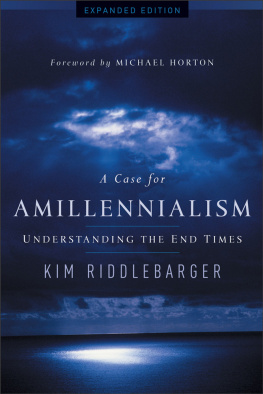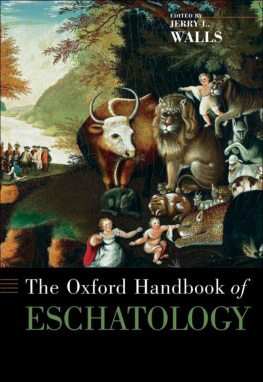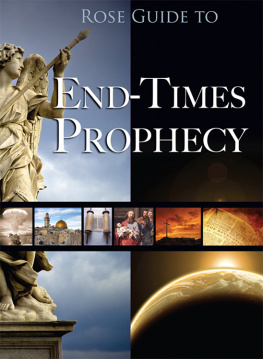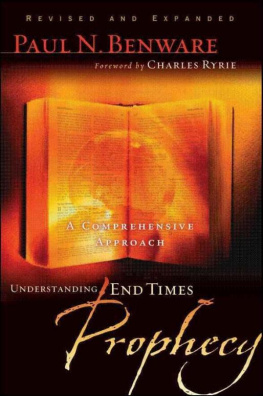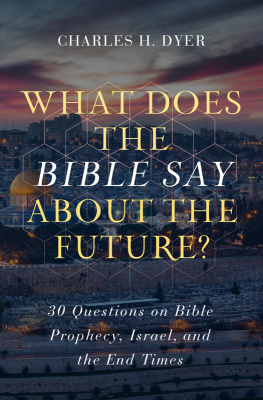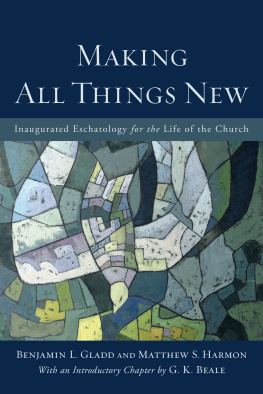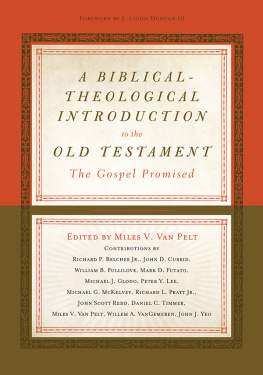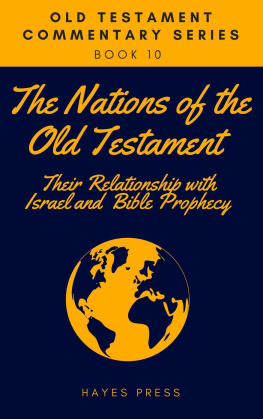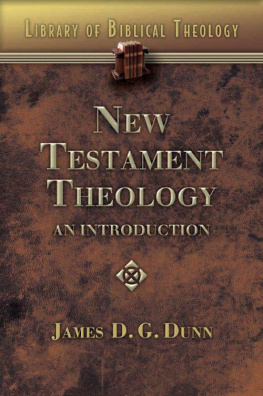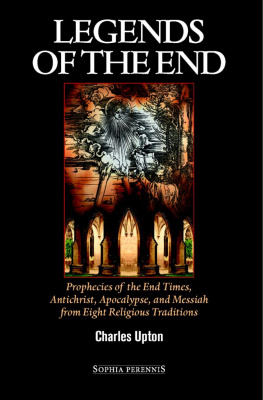2003, 2013 by Kim Riddlebarger
Published by Baker Books
a division of Baker Publishing Group
P.O. Box 6287, Grand Rapids, MI 49516-6287
www.bakerbooks.com
Ebook edition created 2013
All rights reserved. No part of this publication may be reproduced, stored in a retrieval system, or transmitted in any form or by any meansfor example, electronic, photocopy, recordingwithout the prior written permission of the publisher. The only exception is brief quotations in printed reviews.
ISBN 978-1-4412-4266-2
Library of Congress Cataloging-in-Publication Data is on file at the Library of Congress, Washington, DC.
Unless otherwise indicated, Scripture quotations are from the Holy Bible, New International Version. NIV. Copyright 1973, 1978, 1984 by Biblica, Inc. Used by permission of Zondervan. All rights reserved worldwide. www.zondervan.com
Scripture quotations labeled ESV are from The Holy Bible, English Standard Version (ESV), copyright 2001 by Crossway, a publishing ministry of Good News Publishers. Used by permission. All rights reserved. ESV Text Edition: 2007
In memory of my ancestors who died in Christ:
| Christian Riddlespurger | (17151790) |
| John Riddelsperger | (17431828) |
| Jacob Riddlesberger | (17851828) |
| Daniel Riddlesberger | (18141878) |
| David Riddlesbarger | (18381909) |
| Albert Riddlesbarger | (18671931) |
| Glenn Riddlebarger | (18941964) |
| Clayton Riddlebarger | (19181969) |
They have come to life and are reigning with Christ for a thousand years.
Contents
Acknowledgments
Thanks to the consistory of Christ Reformed Church for the sabbatical leave and support needed to do the research associated with this project. Thanks also to the members of our congregation for all your prayers and support, especially those of you who ask the hard questions during the Wednesday night Bible study. But a special word of appreciation goes to the White Horse Inn crewMichael Horton, Ken Jones, Rod Rosenbladt, and our producer, Shane Rosenthalfor much encouragement and fruitful conversation throughout the years. Thanks also to Dr. Lee Irons and Dr. Brett Provance for your helpful suggestions with the manuscript. And as always, thanks to my wife, Micki, and sons, David and Mark, for being so patient.
Foreword
Christ has died; Christ is risen; Christ will come again. Part of the communion liturgy from ancient times, this sentence is the gospel in nuce . For two millennia, Christians who disagree over a host of other important points have confessed this faith together. They have recognized that, according to Scripture, the promise of Christs future return is inseparable from his crucifixion and resurrection in the past. So we fix our eyes on Christ, the author and finisher of our faith (Heb. 12:2).
Before taking up areas of controversy, it is important that we recognize that remarkable consensus. As we confess in the Nicene Creed, Christ will come again, with glory, to judge the living and the dead, whose kingdom will have no end. Therefore, the issues raised in A Case for Amillennialism are part of an ongoing conversationeven debateamong Christians who do not question the integrity of each others profession of faith.
In that case, whats the point? Why invest the time in reading a book like this, when the issues are not life and death and there seem to be so many fine Christians holding significantly different views? Let me offer a few reasons in favor of engaging these issues.
First, all of Scripture is inspired by God and therefore profitable (2 Tim. 3:16). In the Great Commission itself, Jesus commanded his disciples to teach their disciples everything he had delivered to them. Kim Riddlebarger and I share a similar church background, where commitment to the dispensational system (premillennial-pretribulational rapture) was expected. In fact, statements of faith often gave more space to this point than to the Trinity or the person and work of Christ. Bible conferences could spark lively debate, sometimes leading to serious dissension, over the identity of the Antichrist or the precise sequence of end-times events. In reaction, many who were raised in a similar background profess agnosticism regarding eschatology, beyond the simple formula, Christ will come again. These brothers and sisters are correct to see this formula as the primary eschatological affirmation that binds all Christians, but if Scripture reveals more than this, then we are all obligated to learn more than this.
Second, all of Scripture is unified around the person and work of Jesus Christ. There is one unfolding plot from Genesis to Revelation. Although there are distinctive subplots, they too feed ultimately into the drama that begins with the promise of a Satan-crushing Redeemer in Genesis 3:15 and ends with the Hallelujah Chorus in the book of Revelation. From an amillennial perspective, dispensationalism tends to undermine this narrative unity that centers on promise and fulfillment in Christ with one plan of redemption for one people of God drawn from every nation. Dispensationalists respond with the charge that amillenarians have a spiritualizing way of interpreting Scripture that negates its literal sense. What this means is that our differences are not merely over what we believe Scripture teaches about the end times but how we interpret Scripture from beginning to end. Both sides in the controversy will agree that these differences are no small matter.
Third, although eschatology means last things, it has enormous bearing on the way we understand the past and the present. We are created as inherently prospective beings, with a goal. That goal to a large extent determines our identity and way of living in the present. Postmillennialism has tended to generate optimistic programs for ushering in the kingdom of God, while premillennialism (especially in its dispensational form) is by comparison more pessimistic. For amillenarians, though, things are not getting better and better or worse and worse. Rather, the whole period between Christs two advents is marked, paradoxically, by miraculous growth of Christs kingdom by his Word and Spirit alongside the obdurate opposition of the world to the Messiah and his coheirs. The kingdom is already and not yet: present here and now in the form of weakness yet in the power of Christs resurrection, to be revealed at Christs coming as the kingdom of glory. Only then will the kingdoms of this age become the kingdom of our God and of his Christ forever. Obviously, this has tremendous implications for the identity of the church and its missionas well as its relation to the nations and empires of this ageand the hope for the future that drives us in the present.
For these and many other reasons, the topics covered in this book are of enormous importance for us. And this particular book is exactly what we have needed. While helpful defenses of the amillennial view are available, Kim Riddlebargers is unique. First, he once held the views he critiques. It is easier to be dismissive or to unintentionally mischaracterize the views of others from afar. However, Ive been impressed over the years with how informed and sympathetic Kim is in his engagement with alternative eschatologies. He does not lump postmillennialism with theocratic movements or premillennialism with popular end-times novels. Nor does he overlook the important differences between classic and progressive dispensationalism.
Second, Kim is a model scholar-pastor. He has studied under great biblical scholars as well as historical and systematic theologians at the graduate and postgraduate level. As a pastor, he brings these resources to bear on every sermon and lecture without burying his flock in footnotes. For nearly two decades, he has been the pastor of the same church and has brought Gods Word to bear on the daily lives of Christs people. Both of these key aspects of his calling are evident throughout A Case for Amillennialism .
Next page
